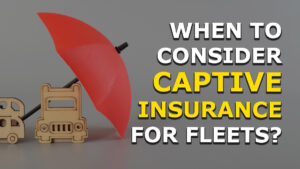As the old adage goes, “location, location, location.” Where you choose to start your trucking company could save you thousands on insurance.
In a previous article, we discussed the underwriter mindset and how driving routes may causing high insurance rates.
Many of you have asked other questions around how geographic locations affect insurance premiums.
Below is a complete guide about the importance of location from trucking startup, garaging zip codes, and growing your fleet.
Startup business location is important

One of the easiest ways to save thousands of dollars in insurance premiums when you first start your trucking company is the geographical location of your business.
You see a lot of tips online mentioning which states are best to start a trucking company, but this isn’t granular enough. You need to consider the city and zip code as well.
In most cases, it is best to avoid major cities or areas susceptible to severe weather.
For example, trucking insurance is expensive in Atlanta, GA. However, a new carrier can save thousands of dollars if they just start the location of their business outside of the city.
If you already started your business, you could consider moving your business location out of high-risk zip codes and then update your information with the insurance provider to help lower rates at renewal.
Generally, the most expensive zip codes for full auto insurance coverage are:
- Detroit, MI (48226)
- New York City, NY (11212)
- New Orleans, LA (70117)
- Las Vegas, NV (89101)
- North Hollywood, CA (91605)
- Philadelphia, PA (19140)
- Baltimore, MD (21216)
- Goose Rock, KY (40944)
- Brownsville, FL (33142)
- Irvington, NJ (07111)
Location consistency is important

It is best practice to live and have your driver’s license in the same state that your business will be located in.
If your place of business has an address in New Jersey, the insurance company expects your driver’s license to be in New Jersey as well.
Additionally, if you declare to the insurance company on your application that you are going to operate within a 500-mile radius of your New Jersey place of business, yet have a Florida driver’s license, that causes yet another unexpected mismatch.
If there is a mismatch, you will almost always see a significant insurance premium increase.
Garaging address location is important

In general, living in an urban area compared with a rural area can have a major impact on rates. In a metro area where there are more cars on the roads and more traffic, accidents are more likely, pushing rates higher.
The term “garaging address” is just where you store your vehicle when you are not using it.
- If you are home every night, then your garaging address would be considered your home.
- If you store your vehicle in a storage facility or park in a private lot, those areas would be your garaging address.
Potential complications may arise if you have multiple addresses.
If you spend your time between properties in different states, you will need to calculate where you spend most of your time. The place where you spend the most amount of time would become your garaging address.
If you plan to make changes to your garaging address, it is recommended that you notify your insurance company as soon as possible. Your insurer can make the necessary adjustments to your insurance policy to protect you against possible risks.
But you should also be careful of fraud.
There was a recent fraud case that was caught after AIPSO’s New Jersey Automotive Insurance Plan representatives noticed a surge of 400 trucks representing 170 companies in commercial trucking insurance applications that showed they were garaged at a truck stop that could only hold about 30 trucks.
The location of the truck stop is important as the state is divided into approximately 40 regions, each with a different premium rate. The difference between the least and most expensive region can be as high as $40,000 per truck, per year, according to the investigation.
During this time, the truck stop was in the least expensive rated region.
Delivery radius is important

It is also important to consider your expected routes and delivery radius. Most insurance companies want you to stay interstate or within a 500 air-mile radius from your business location for the first couple of years of your business.
As you prove your safety history and show you can manage your company well, then expanding to long-haul trucking will be more affordable.
If you are committed to start as a long-haul trucking business, then expect to pay expensive insurance premiums for a couple years.
Employing out-of-state drivers can be expensive

If you want to grow your young business by adding new drivers, insurance companies want these drivers to stay within a localized 500-mile radius location for the first couple of years until you gather more evidence of good business management and safe driving history.
For example, out-of-state drivers tend to cost $10,000 per person in insurance premiums for startup carriers.
It is recommended to not use out-of-state drivers for the first three years of business.
Fuel prices range by location

Obviously, diesel fuel prices are extremely high.
That is why it is important to consider your geographic location and routes and how they affect your expected fuel prices.
A 236-gallon fuel stop cost one driver $1,227.49, which would cover about 1,500 miles. For this driver, this equates to three days of travel. This means the weekly cost of fuel would be closer to $2,454.98.
If the driver heads to the west coast, prices would be considerably more expensive, affecting your bottom line.
Generally, states with the most expensive diesel prices are:
- California
- Nevada
- Alaska
- Washington
- Arizona
However, if you haul in Tennessee or Texas, fuel prices tend to be more affordable and less regulations to deal with on a state level.
Routes matter too

Underwriters also look at the location of frequent routes your drivers travel.
Insurance companies are big fans of regular routes as it lowers the overall risk of an accident because the more regular routes you operate in, the more familiar your drivers are.
However, the location of these frequent routes could negatively affect your risk as well.
Underwriters use road safety data that highlight the more dangerous roadways to map out which states, metropolises, and cities are the riskiest to travel in.
For example, DOT’s National Highway Traffic Safety Administration releases data each year on motor vehicle traffic deaths. In 2018 and 2019, the top 5 states for motor traffic deaths by state was California, Texas, Florida, Georgia, and North Carolina.
One-half of the top ten trucking accident factors can be tied to location. These factors include:
- Traffic flow interruption and congestion
- Traveling too fast for conditions
- Unfamiliarity with roadways
- Roadway problems
- Missing required stops
According to a recent TRIP report, California tops the list of congested urban interstates, while Nevada holds the number one spot with the most significant increase in vehicle miles of travel (VMT).
Omnitracs data reflects this in their live map of the U.S. that shows the most dangerous locations for commercial vehicles based on aggregated customer and third-party data. The initial data shows that the most hazardous locations are in the Mid-Atlantic, Northeast, Florida, and Texas.
Underwriters know that due to the associated issues related to dangerous locations, drivers are more likely to exhibit high-risk driving behaviors in these areas.
Letting your underwriter know the safer routes your drivers frequently travel will help you reduce your overall risk and insurance rates.
How can you find the best commercial truck insurance rates?
Allow a CNS Insurance Commercial Trucking Insurance Specialist pull multiple insurance quotes for you to find the best rates.
It never hurts to get a quote and try saving money on your insurance premiums.
Give us a call anytime and we can discuss lowering your premiums or getting a quote to see where you stand.
Before we can get you an estimate, we are going to need some information.
Fill out a complete quote or quick quote to get started.
If you have any questions or concerns, please call us at 800.724.5523 or email info@cnsinsures.com.






